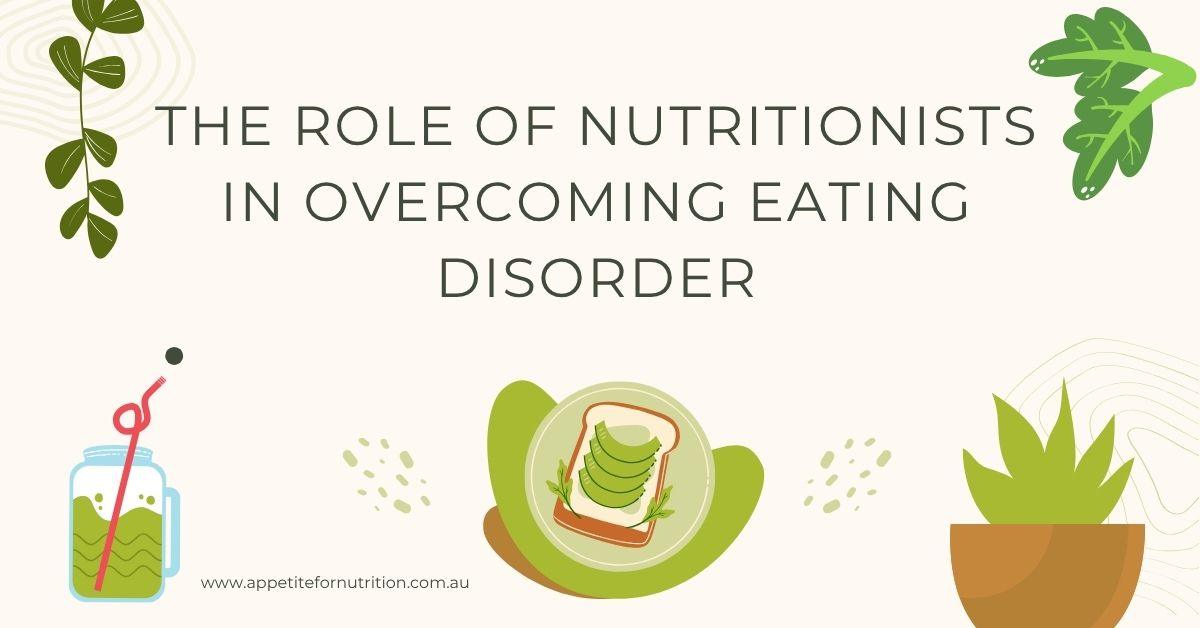
The Role of Nutritionists in Overcoming Eating Disorder
Eating disorders can deeply affect both physical and mental health — influencing not only how a person eats, but also how they feel about themselves, their body, and their overall wellbeing.
An eating disorder nutritionist plays a vital role in recovery, offering personalised, evidence-based nutritional care to help rebuild a healthy relationship with food and restore physical balance.
Whether in private practice or working as an NDIS dietitian, these professionals provide compassionate, practical guidance that supports sustainable healing and long-term wellbeing.
Understanding the Role of an Eating Disorder Nutritionist
An eating disorder nutritionist does far more than develop meal plans. Their primary role is to help clients rebuild confidence around food, understand their body’s needs, and develop a balanced, non-restrictive relationship with eating.
Key Responsibilities
Individualised Assessment: Every person’s recovery journey is unique. A dietitian assesses nutritional needs, medical background, lifestyle, and emotional context to create a tailored plan.
Nutrition Education: They help clients understand how balanced nutrition supports mental and physical health, while dispelling myths around “good” and “bad” foods.
Restoring Nutritional Balance: Safe and gradual strategies are used to correct deficiencies and restore essential energy levels, vitamins, and minerals.
Rebuilding Trust with Food: By working collaboratively with psychologists, GPs, or other healthcare professionals, clients learn to eat without fear, guilt, or restriction.
The Importance of NDIS Dietitians in Eating Disorder Recovery
For individuals living with disabilities, recovery may present additional challenges. A NDIS dietitian provides essential, accessible support through the National Disability Insurance Scheme (NDIS) — helping participants achieve nutritional stability and independence.
Benefits of Working with an NDIS Dietitian
Tailored Support: Dietitians recognise how disability can affect eating habits and create fully personalised strategies.
Practical Meal Planning: NDIS dietitians design structured, easy-to-follow plans that reduce anxiety and promote autonomy.
Improved Long-Term Outcomes: Ongoing care helps prevent relapse, correct deficiencies, and build sustainable wellbeing.
Learn more: Nutrition Tips for NDIS Participants: How an NDIS Dietitian Can Support Your Health and Independence
Creating a Safe and Supportive Recovery Environment
Recovery from an eating disorder requires trust, time, and compassion. Dietitians create a non-judgmental and supportive space, empowering clients to work through challenges at their own pace.
They help clients to:
Address underlying emotional triggers, such as anxiety or perfectionism.
Set achievable goals, like reintroducing certain foods or establishing consistent meal patterns.
Involve family or carers to provide education, encouragement, and accountability.
Learn more: How a Nutritionist Can Help You Maintain a Healthy Lifestyle
Managing Malnutrition and Physical Health Risks
Many eating disorders cause malnutrition, dehydration, and nutrient deficiencies, leading to complications such as low bone density, reduced immunity, or cardiovascular issues.
An eating disorder dietitian helps restore health by:
Gradually increasing nutrient intake and energy levels.
Monitoring weight, hydration, and blood markers safely.
Addressing deficiencies in vitamins and minerals to promote recovery.
This careful, clinical approach ensures physical restoration aligns with emotional healing.
Supporting Behavioural Change for Life
Recovery is not just about eating again — it’s about redefining the relationship with food and body image. A dietitian supports clients in developing lifelong skills such as:
Mindful Eating: Listening to hunger and fullness cues without judgment.
Balanced Habits: Learning to enjoy all foods in moderation without guilt.
Self-Compassion: Focusing on progress, not perfection.
Over time, these skills create resilience and confidence around food — key ingredients for lifelong recovery.
Ready to Begin Your Recovery Journey?
If disordered eating, anxiety around food, or nutritional imbalances are impacting your wellbeing, our Accredited Practising Dietitians are here to help.
We offer both general nutrition consults and specialised eating disorder dietitian support, available online and in person across Brisbane, Gold Coast, Melbourne, Shepparton, Bendigo and Albury-Wodonga.
Contact Appetite for Nutrition today for individual consults or tailored meal plans designed to help you eat well and feel your best.
This blog was last updated October 2025.
Frequency Asked Questions
Find quick answers to common questions about NDIS dietitian support, healthy eating, and supermarket snack choices.
Our NDIS-registered dietitians help clients reconnect with food in a safe, supportive way — creating recovery-friendly meal plans and practical strategies that encourage nourishment, confidence, and long-term wellbeing.
A dietitian is a qualified health professional who can provide medical nutrition therapy. An eating disorder nutritionist or dietitian specialises in supporting individuals with disordered eating, focusing on both physical and emotional aspects of recovery.
Yes. Dietitians provide structured meal planning, education, and behavioural strategies to help normalise eating patterns and reduce feelings of guilt or loss of control.
Under the NDIS, dietetic support can be funded if it relates to functional goals, independence, or improved quality of life. Your NDIS dietitian can help navigate eligibility and create a care plan.
You can self-refer or be referred by a GP or psychologist. Many dietitians also offer Medicare rebates under an Eating Disorder Plan or Chronic Disease Management Plan.
The first session includes a full nutrition assessment, goal setting, and education around food, hunger, and recovery. From there, a tailored plan is created — including structured meals and ongoing support.



